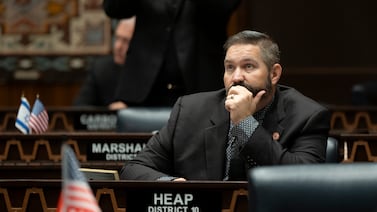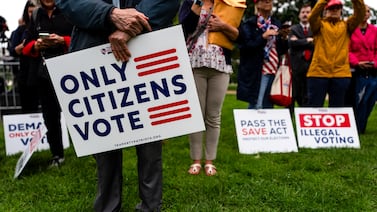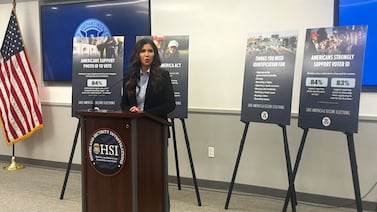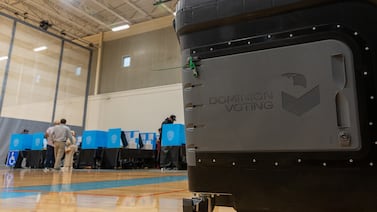Votebeat is a nonprofit news organization reporting on voting access and election administration across the U.S. Sign up for Votebeat Pennsylvania’s free newsletter here.
Stricter voter ID requirements would likely not have prevented people from casting fraudulent ballots in the vast majority of cases charged in Pennsylvania over the past decade, a Votebeat and Spotlight PA analysis shows.
Over the 10 years, the organizations found 14 instances in which law enforcement or election officials say at least one fraudulent ballot was cast.
The analysis is based on Pennsylvania court system data on election crimes charged between July 2015 and July 2025, and additional reports identified by the Heritage Foundation, a conservative think tank. The organizations then cross-checked this data with news reports and charging documents to determine whether any fraudulent ballots were cast.
All told, law enforcement or election officials say 149 fraudulent ballots were submitted over the 10 years.
The analysis did not include cases charged under statutes other than the Election Code or excluded from public court records due to expungements or other determinations. It’s also possible that not every instance of ballot fraud is identified by law enforcement. But the findings are in line with previous research on the topic suggesting that incidences of such fraud are exceedingly rare.
And of the instances identified, according to the analysis, just two could have been potentially prevented by the stricter voter ID rules proposed in Pennsylvania’s House Bill 771, which is under consideration in the legislature.
That’s two out of roughly 61 million ballots cast, a rate that’s less than half the odds of winning a $1 million prize in the Powerball lottery.
“This is exactly what those of us who studied the issue have known all along,” said Joshua Douglas, a law professor at the University of Kentucky who helped craft that state’s 2020 voter ID legislation. “Strict voter ID requirements are a solution in search of a problem, because to rig an election or change an election result through this kind of voter fraud, you would need a whole lot of people involved to make a difference, because you don’t know how many votes you need to steal.”
But the amount of fraud expanded voter ID could prevent is not the only consideration. State Rep. Tom Mehaffie (R-Dauphin), prime sponsor of HB 771, said Votebeat and Spotlight PA’s findings don’t change his view on the need for a voter ID requirement.
“That’s not why we did this bill,” he said. “We did this bill for voter confidence.”
How do fraudulent votes get cast?
Under HB 771, voters would have to show any one of 20 different types of documents, such as a driver’s license, student ID, or utility bill, every time they vote. If they cannot show it, they could still cast a regular ballot after signing an affidavit affirming their identity. The affidavit option, which other states currently offer, helps ease concerns among critics of voter ID laws that they could unfairly disenfranchise voters who don’t have easy access to ID.
Currently, voters in Pennsylvania are required to show an ID when they vote at a new polling place for the first time.
Supporters of voter ID laws often tout them as a commonsense election security measure, but it’s not clear that they play a significant role in preventing fraudulent votes.
Most of the 149 fraudulent ballots Votebeat and Spotlight PA’s analysis found were cast with the assistance of a poll worker. Roughly two-thirds of them came from a scheme in which former U.S. Rep. Michael “Ozzie” Myers — who had served prison time for his role in the 1970s ABSCAM bribery scandal — paid Philadelphia poll workers to add votes for candidates he supported in several elections from 2014 to 2018.
Many of the remaining fraudulent votes were mail ballots applied for and cast by someone who had access to a Pennsylvania voter’s personal information, according to law enforcement, as was the case in a 2021 mayoral election in Millbourne. This included information that would be on the documents required under voter ID laws.
One instance that may have been prevented by the voter ID legislation currently in the state House came in 2020, when a man who had already voted returned to a polling place in Chester County to cast a vote on behalf of his son. Another was a 2016 ballot cast in Westmoreland County by a man who lived in Allegheny County.
Christopher Spackman, elections director for Dauphin County, said election administrators have mechanisms in place to detect attempts to vote fraudulently. For instance, if a voter is mailed a ballot and then dies, the death is noted in the state’s voter management system. If the ballot is completed and returned, election officials know not to count it and to refer it to investigators.
“There’s really not many options for voter fraud to occur as it is,” he said, adding that what paths there are are generally going to be discovered “on the back end.”
Voter ID requirement is widely popular
Even with the existing safeguards, requiring voters to show some form of ID every time they vote remains a widely popular election policy. A 2024 study from the Pew Research Center found that 81% of Americans favor requiring photo ID to vote, and a poll from Franklin & Marshall College, also from 2024, found 73% support among Pennsylvanians.
Douglas, who helped write Kentucky’s voter ID law, said the idea has achieved such high levels of support not only because it has become a rallying cry for those who support theories of stolen elections, but also because it seems like such a simple requirement.
“I think for most people it sounds like common sense,” he said. “Of course I have an ID in my pocket. Why wouldn’t I bring it?”
He noted that in other countries people often find it odd that the U.S. does not have a nationwide ID requirement for voting. But the U.S. doesn’t provide citizens with a national ID card, as many other countries do, and it lets states set most voting policies.
Mehaffie, the bill sponsor, told Votebeat and Spotlight PA recently that he frequently hears from voters concerned about election security, and he sees the legislation as a way to address those concerns without disenfranchising anyone or creating too big a burden on voters.
He said he and his co-sponsors crafted the bill with potential court challenges in mind, so that it could avoid the fate of Pennsylvania’s strict 2012 photo ID law, which was challenged in court and struck down as unconstitutional.
Opposition to voter ID requirement is softening
The American Civil Liberties Union of Pennsylvania, which brought that challenge, has said it is neutral on Mehaffie’s bill.
And Democrats in Harrisburg have been less resistant in recent years to expanding voter ID requirements. Gov. Josh Shapiro has said he is open to expanded voter ID rules, so long as they don’t disenfranchise voters, and earlier this year, state House Speaker Joanna McClinton (D-Philadelphia), a longtime opponent of voter ID requirements, made similar comments.
Manuel Bonder, a spokesperson for Shapiro, directed a reporter to the governor’s previous comments when asked if he would support the version of voter ID proposed in House Bill 771.
Not all Democrats are on board, though. At a May hearing of the House State Government Committee, Rep. Malcolm Kenyatta (D-Philadelphia) dismissed the bill as unnecessary.
The bill still passed out of the committee with Democratic support, but it’s currently stalled in the House. Mehaffie said he hears from his Republican colleagues that the bill isn’t strict enough, and from Democrats that it is unnecessary. Meanwhile, Republican leaders in the state Senate have insisted that a voter ID requirement be passed through a constitutional amendment, so it wouldn’t be as vulnerable to court challenges on constitutional grounds.
With the state budget stalled and public transit funding dominating attention in the state Capitol, Mehaffie said his bill isn’t currently part of negotiations. Still, he urged lawmakers on both sides to take a pragmatic approach to finding the best possible compromise.
“To my colleagues in the Republican caucus, I would say, you know, this is the best you’re gonna get,” he said. “To my Democratic colleagues, I would say, you know, look at the polls, look where things are at. … It is a bipartisan issue.”
Carter Walker is a reporter for Votebeat in partnership with Spotlight PA. Contact Carter at cwalker@votebeat.org.





